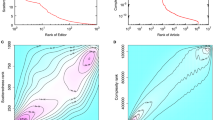Abstract
We consider collaborative editing systems in which users contribute to a set of documents, so that each document evolves as a sequence of versions. We describe a general technique for endowing such collaborative systems with a notion of content-driven reputation, in which users gain or lose reputation according to the quality of their contributions, rather than according to explicit feedback they give on one another. We show that content-driven reputation systems can be obtained by embedding the document versions in a metric space with a pseudometric that is both effort preserving (simple changes lead to close versions) and outcome preserving (versions that users perceive as similar are close). The quality of each user contribution can be measured on the basis of the pseudometric distances between appropriately chosen versions. This leads to content-driven reputation systems where users who provide contributions of positive quality gain reputation, while those who provide contributions of negative quality lose reputation. In the presence of notification schemes that prevent the formation of “dark corners” where closed groups of users can collaborate without outside interference, these content-driven reputation systems can be made resistent to a wide range of attacks, including attacks based on fake identities or specially-crafted edit schemes.
Access this chapter
Tax calculation will be finalised at checkout
Purchases are for personal use only
Similar content being viewed by others
References
Adler, B.T.: WikiTrust: content-driven reputation for the Wikipedia. Ph.D. Thesis, University of California, Santa Cruz (2012)
Adler, B.T., Chatterjee, K., de Alfaro, L., Faella, M., Pye, I.: Assigning trust to Wikipedia content. In: WikiSym 08: Proceedings of the International Symposium on Wikis. ACM Press, New York (2008)
Adler, B.T., de Alfaro, L.: A content-driven reputation system for the Wikipedia. In: Proceedings of the 16th International World Wide Web Conference (WWW 2007). ACM Press, New York (2007)
Adler, B.T., de Alfaro, L., Mola-Velasco, S.M., Rosso, P., West, A.G.: Wikipedia vandalism detection: combining natural language, metadata, and reputation features. In: Gelbukh, A. (ed.) CICLing 2011, Part II. LNCS, vol. 6609, pp. 277–288. Springer, Heidelberg (2011)
Adler, B.T., de Alfaro, L., Pye, I.: Detecting Wikipedia vandalism using WikiTrust. In: PAN Lab Report, CLEF (Conference on Multilingual and Multimodal Information Access Evaluation) (2010)
Barabási, A.-L., Albert, R.: Emergence of scaling in random networks. Science 286(5439), 509–512 (1999)
Chatterjee, K., de Alfaro, L., Pye, I.: Robust content-driven reputation. In: First ACM Workshop on AISec, ACM Press, New York (2008)
Cheng, A., Friedman, E.: Sybilproof reputation mechanisms. In: Proceedings of the ACM SIGCOMM Workshop on Economics of Peer-to-Peer Systems. ACM Press, New York (2005)
Clauset, A., Shalizi, C.R., Newman, M.E.J.: Power-law distributions in empirical data. SIAM Rev. 51(4), 661–703 (2009)
Douceur, J.R.: The sybil attack. In: Druschel, P., Kaashoek, M.F., Rowstron, A. (eds.) IPTPS 2002. LNCS, vol. 2429, pp. 251–260. Springer, Heidelberg (2002)
Girvan, M., Newman, M.E.J.: Community structure in social and biological networks. Proc. Nat. Acad. Sci. 99(12), 7821–7826 (2002)
Levine, B.N., Shields, C., Margolin, N.B.: A survey of solutions to the sybil attack. Technical Report 2006–052, University of Massachussets Amherst (2006)
Osborne, M.J., Rubinstein, A.: A Course in Game Theory. MIT Press, Cambridge (1994)
Sankoff, D., Kruskal, J.B. (eds.): Time Warps, String Edits, and Macromolecules: The Theory and Practice of Sequence Comparison. CSLI Publications, Stanford (1999)
Author information
Authors and Affiliations
Corresponding author
Editor information
Editors and Affiliations
Rights and permissions
Copyright information
© 2014 Springer International Publishing Switzerland
About this paper
Cite this paper
de Alfaro, L., Adler, B. (2014). Content-Driven Reputation for Collaborative Systems. In: Abadi, M., Lluch Lafuente, A. (eds) Trustworthy Global Computing. TGC 2013. Lecture Notes in Computer Science(), vol 8358. Springer, Cham. https://doi.org/10.1007/978-3-319-05119-2_1
Download citation
DOI: https://doi.org/10.1007/978-3-319-05119-2_1
Published:
Publisher Name: Springer, Cham
Print ISBN: 978-3-319-05118-5
Online ISBN: 978-3-319-05119-2
eBook Packages: Computer ScienceComputer Science (R0)




